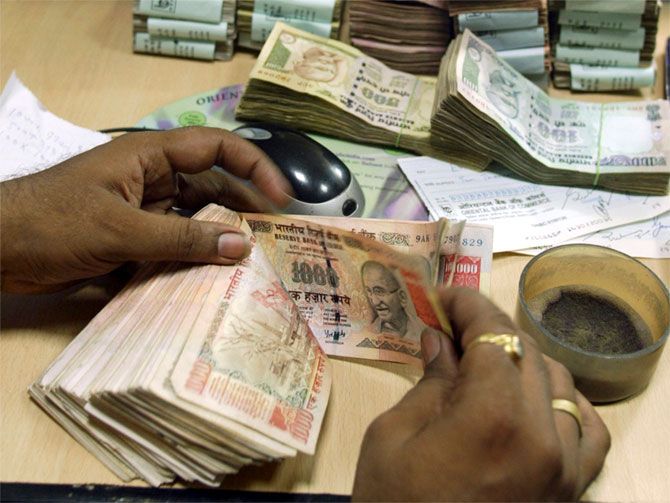 | « Back to article | Print this article |
 The thorny political equations, which investors have been struggling to solve for the past six months, have turned out to be unexpectedly easy.
The thorny political equations, which investors have been struggling to solve for the past six months, have turned out to be unexpectedly easy.
The BJP doesn't need external support; Narendra Modi can select the Cabinet he wants.
The NDA can also hope to drive through economic legislation that may be needed.
There should not be too much in the way of trouble finding capital either.
The enthusiastic buying of the FIIs, ever since Modi was announced as a prime ministerial candidate in September 2013, makes it clear that overseas capital is ready and willing to support the Indian economy.
If the BJP can cut through the monstrous thickets of red tape that impede commerce, FDI will also be available across various sectors.
The BJP will, however, have to shed its own fixations about 'Swadeshi'.
On the domestic front as well, it is clear that Modi has massive support across corporate ranks. Retail investors trust him, too.
Domestic financial institutions (DFIs) have been much more cautious than FIIs. But given the mandate, DFIs are now likely to get on to the bandwagon as well.
Over the next three-six months, the new government will be in its honeymoon period, with the leeway to get unpleasant things done.
It is in a situation where it could tackle long-standing issues such as labour reform, or embark on the introduction of the long-overdue GST.
It could also clear stalled projects and review various subsidies on the energy, food and fertiliser fronts.
Much of the sentiment will hinge on the intentions that are announced in the Budget as well and also on the market's perception of how well the new government is getting on with the RBI.
If the right decisions are taken, GDP growth should accelerate through the second half of 2014-15 and it need not be inflationary.
Nor should the rupee be allowed to harden to the point where it hurts export competitiveness.
This is where cooperation between the Modi government and the central bank will be essential.
In that case, the market should be capable of maintaining its upward trajectory over the long run.
There should, over the next year, be a shift in the way that households allocate their savings.
Some hard-earned money will move out of gold, other physical assets and bank fixed deposits, into equity and risk-related instruments.
There will also be a revival in consumption demand as confidence returns after years of stagflation.
There are genuine risks, however.
An economy the size of India doesn't shift momentum too quickly and expectations riding on the new government are very high.
GDP growth might take a year or more before it shifts back into a higher gear. In that time, the financial markets could run up too high and enter bubble territory before the real economy recovers.
There could also be inflation if the money supply tap opens too quickly. There could be currency-related woes if the rupee gets too strong or it gets too weak.
As of now, the financial markets are trading high but they are nowhere near bubble territory.
As I calculated in last week's column, critical valuations such as the market Price Book Value (PBV) ratio and the Price Earnings (PE) ratio are fairly close to their long-term averages.
Even the spurt last Friday, when the Nifty moved past 7,550 for a brief moment, did not push the market into bubble territory.
But although the market is not in bubble-land, it is overvalued and apparently anticipating a rapid surge in corporate earnings.
This may not arrive in the anticipated time frame. That implies a scenario when disappointed punters lose their patience and cash out, causing a big correction.
Under the circumstances, the retail investor should consider systematic investments by committing approximately equal amounts every month.
Whether the investor does this via the mutual fund route or by stock-picking is his business.
Obviously, funds are more convenient since they have automatic plans and broad index funds are also diversified.
But a lot of investors might like to try honing stock-picking skills.
The advantage with systematic investment is that you get an averaged price and that is also the disadvantage. It depends on price trajectory.
If prices go straight up, you don't want an averaged price. You would rather invest heavily early on.
Systematic investment assumes there will be a correction some time and that will lower acquisition costs.
Right now, the majority of investors don't think there will be a correction.
But the market has run up 15 per cent in a matter of a few months and it is very likely to give back some of those gains at some stage.